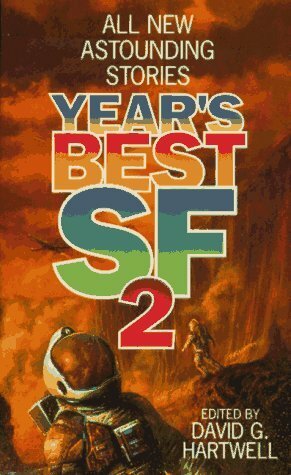
The blurb:
Editor David G. Hartwell started this annual anthology series because he felt that the "other" best science fiction anthology (The Year's Best Science Fiction) included stories that weren't quite science fiction. Now in its second year, this anthology is proving that there is plenty of great "traditional" work being published in the field, and enough good stories to go around for both anthologies (although there is some overlap between them). In this edition Hartwell showcases talents such as Terry Bisson, James Patrick Kelly, Gene Wolfe, and Allen Steele. No matter how you define science fiction, you'll find something of interest in this excellent collection.
I took my time reading this one, but it's a pretty chunky book — 441 pages in the print version (I have the e-book version).
The thing I love about this sort of anthology is that you likely won't like or love every story — but in any decently edited collection, there'll be something for most readers, from a range of authors1 represented:
Like I said, not everything is going to appeal to everyone, and that's the fun of anthologies. Flagging a couple I particularly enjoyed, though:
Thinkertoy: short and nasty. Thinkertoys are the newest hot gadget for kids, and others who like to tinker and build. A father buys one for his disturbed son, recently left motherless after a car accident. It...does not work out well for everyone.
Out of the Mouths: part of her Xenolinguist series, which I haven't read. It's about the difficulties in understanding one another; there's a war going on with another species, we can't understand them and they don't seem to be able to understand us. Xenolinguists take a child from each culture and try to raise them together, reminiscent of Frederick II's alleged experiment to see what happens if children are raised without language. It backfires when the human child ends up taking in more than just the foreign language (see also: Story of your Life, adapted as Arrival, by Ted Chiang for an examination of how language shapes life).
Breakaway, Breakdown: how environment — space, in this case — shapes people (literally) and relationships.
Tobacco Words: an unusual exploration of unusual costs of space travel.
Bicycle Repairman: really enjoyed this, very cyberpunk/Shadowrun sort of feel to it.
Nonstop to Portales: probably the one I enjoyed most in the collection. A travelling salesman is stuck for a couple of days in the armpit of the world, a town with absolutely no claim to fame. Except it maybe will have one in the future...
The other thing worth noting in this collection is how many of the stories are built directly on the backs of others: After A Lean Winter is set in the world of HG Wells's War of the Worlds; The Spear of the Sun is GK Chesterton's Father Brown in space; Counting Cats in Zanzibar is either Asimov's Susan Calvin or someone so closely modelled on her as to be indistinguishable; and Columbiad proposes that Jules Verne's From the Earth to the Moon actually happened, and has HG Wells as the protagonist.
1"Range of authors" is relative. Here, I mean in terms of themes, writing styles, ideas tackled. Certainly not much of a range demographically — 20 authors, nine of them are white American men, four are white UK men, one is a white Canadian man; four are white American women, two are white UK women. Fourteen men, six women, all of them white. 1996 is simultaneously not that long ago subjectively, and yet nearly three decades ago objectively, 20 years pre-Puppies. I've got more in this series to read; it'll be interesting to keep an eye on those stats and see how long it takes before the first person of colour gets a guernsey, or the number of women represented equals the number of men.
Started: 23 March 2025
Finished: 5 April 2025
Back home.
More books.